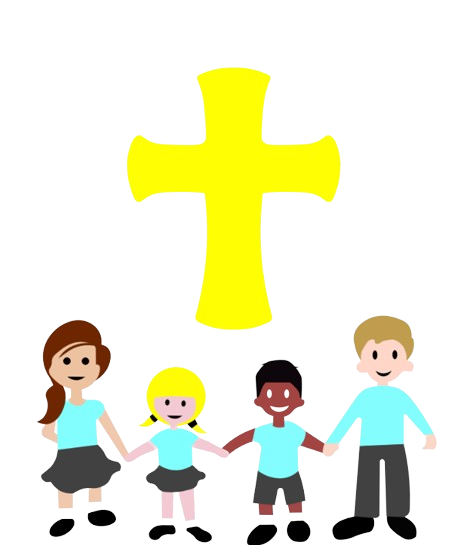Curriculum Statement
Our Curriculum Statement.
Our Curriculum
Our school follows the requirements of the Early Years Foundation Stage and the National Curriculum.
Foundation Stage curriculum, National Curriculum Documents, and Stockport Agreed Syllabus for Religious Education are available for inspection at the school.
Our Curriculum is overseen by a Curriculum Lead and each subject is led by a Subject Leader. Sometimes we also work in small teams. Subject Leaders have overviews of all curriculum subjects and each teacher has an overall plan for the curriculum entitlement of children in their age group. In this way, we ensure continuity and progression in learning throughout the school.
St. Paul’s CE Primary School
Curriculum Statement
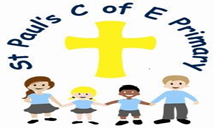
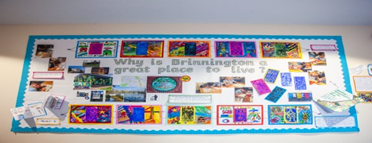
At St. Paul’s CE Primary School our curriculum is underpinned by our vision statement and our core values.
Jesus offers life in all its fullness, and so we inspire our children to flourish and grow in school, the community and the wider world.
Our school is a safe and caring environment, with Christian values at its heart. Our school respects, and welcomes, all faiths, cultures and communities.
We ensure every child is valued, encouraging them to discover their gifts and potential.
Unique and precious in God’s eyes, be the best that you can be.
In our curriculum we want all our children to enjoy learning, and to be curious in gaining new skills and knowledge. We will help them to develop resilience, to accept challenge with a positive mindset, and to have high aspirations every day, and for their future lives. Everything that we will do will help our children to strive for excellence and always aim to,
‘be the best that they can be’
Our curriculum is based on the Early Years Framework in Nursery and Reception and the National Curriculum in Key Stages 1 and 2. We have designed our curriculum to ensure a skill and knowledge based approach to teaching and learning, a curriculum that is sequential and precise with clarity about the key learning objectives in all subject areas. We make links between subjects when they can be meaningful, but where they are not, subjects will be taught individually and with rigour and challenge. We aim to provide a curriculum that is engaging, exciting and balanced. We do emphasise learning of the core skills needed in English and Maths, but we place great value on developing the ‘whole child’ through engagement in a broad range of subjects and experiences.
Curriculum Intent – what our curriculum is trying to achieve
‘Develop a passion for learning. If you do, you will never cease to grow’
A J D’Angelo
Our Christian values and ethos are part of everything that we do at St. Paul’s CE Primary School. These values are the things that we believe in and that help us to make decisions about how we act – they are the values that guide our lives. We weave them into our curriculum in order to give a broad range of opportunities for them to be reflected upon and used in the life of our community.
With our curriculum, we intend to ensure our pupils leave us ready for their next steps, both in and out of a school setting. We offer our children an education in a safe, calm and inclusive environment, where everyone has a sense of belonging. Every child is valued as an individual; we aim to nurture well-rounded, respectful and confident young people who will develop the skills needed for life-long learning. We aim to promote resilience and the ability to be successful and independent learners, respectful of themselves, those around them, our community and the diverse world in which we live. We aim for every child to develop a love of learning, to have high aspirations and to be inspired to achieve their full potential…..’be the best that they can be’
Curriculum Implementation – what do we do to deliver our intent
We fulfil the requirements of the EY Framework and the National Curriculum.
‘The best teachers are those who show you where to look, but don’t tell you what to see’
A K Trenfor
We focus our curriculum on excellence and enjoyment. It is delivered using a variety of approaches and resources, depending on the nature of the subject being taught and the needs of the children. We know that learning is not achieved in one lesson but over a period of time – for this reason, our curriculum is delivered as a progressive model with opportunities for repetition, practice and building constantly on prior learning. We enable children to make links between their learning in order to achieve a greater depth of understanding.
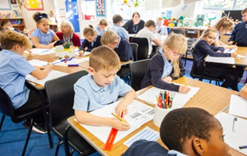
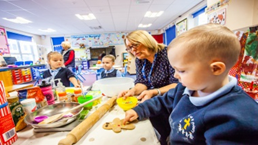
When new learning is introduced, teachers are skilled at presenting it in such a way as to create a sense of excitement about the learning ahead.
Subjects are taught in a way that makes sure children understand what they are learning, using units of work that are discrete subjects. However, there are opportunities built into the sequence of our curriculum when learning in one subject is developed and enhanced by learning in another subject. For example, Y6 study WW2 in History in the Autumn Term, and then, in the Spring Term, they study a WW2 text in their English lessons. This helps to repeat prior learning and extend it in a different context, making that learning deeper. Thinking about flexible groupings, pupils will sometimes work individually, sometimes as part of a group or within a whole class setting, depending upon the nature of the activity and intended learning outcomes.
All lessons consider the needs of all learners, ensuring that adaptive practice is evident in all classrooms to provide the best learning experiences and products of learning for the children.
Children who are working at a higher level are given work to challenge and extend their knowledge, and opportunities to take ownership of their own learning.
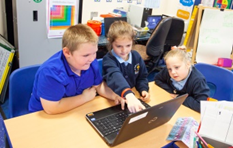
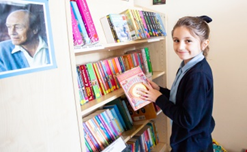
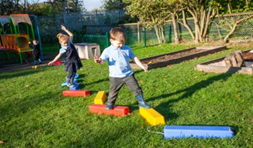
Classroom environments are set out to ensure that they are accessible, using dual coding for resources to help independence, and displays that are a mix of working walls and celebrating children’s work. They are designed to be environments that are not over-stimulating, but calm and conducive to learning.
We try to offer as many trips as possible, both locally and further afield, including residential activities, to give our children access to opportunities and challenges that further develop their experiences and aspirations. We also encourage visitors to school to complement the learning that is taking place.
Children who need additional support are given access to many different interventions, both academic in nature, delivered by highly qualified teaching and support staff, and also to support their social, emotional and mental wellbeing, delivered with the support of our Inclusion Team, Forest School leaders and Meadows and Meanders. The development of positive behaviours for learning is integral to the work that we do and is supported in all classes by our Restorative Approach, Growth Mindset and Zones of Regulation work.
*For further details and information, see our Subject and Year Group Overviews on the website.
Impact – how we ensure that the children are learning and developing effectively
We use a range of assessment strategies to review the progress and attainment of all our pupils, including high-quality AFL strategies and both formative and summative assessments.
This enables teachers to adapt their teaching, lesson content and support to ensure progress for all learners. We have agreed strategies that are used in all classes to help children know more and remember more, and to help teachers make these judgements about what children have learnt. Children reflect and assess their own learning on a daily basis, relevant to their age and experiences.
All staff members have an active part to play in monitoring and evaluating the curriculum, whether as a class teacher, a subject leader, a Phase Leader or member of the SLT. We do this through evidence gathered from: pupil voice, staff voice, book evaluations, planning evaluations, classroom visits, display content, parent/carer voice, Governor voice and data, both internal and externally validated.
It is vital that the information gathered shows the impact of our curriculum in terms of learning and progress, but also shows us impact in how we have developed our children as being curious, aspirational and resilient learners with the ability to strive for excellence in all that they do.
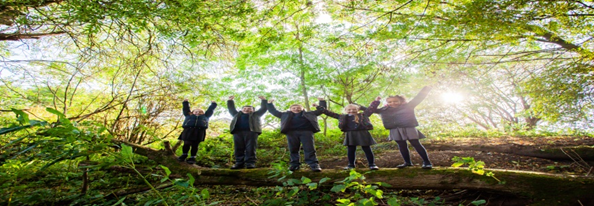
‘Teachers can open the door, but you must enter it yourself’
This is what we want all our children to be able to do.
